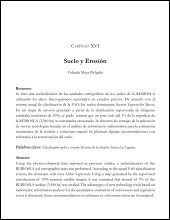Reproducción de cochinilla silvestre Dactylopius opuntiae (Homóptera: Dactylopiidae)
Autor
ARNOLDO FLORES HERNANDEZ
BERNARDO MURILLO AMADOR
EDGAR OMAR RUEDA PUENTE
JOSE CRUZ SALAZAR TORRES
JOSE LUIS GARCIA HERNANDEZ
ENRIQUE TROYO DIEGUEZ
Metadatos
Mostrar el registro completo del ítemResumen
" Por sus características, la cochinilla silvestre ofrece perspectivas de aprovechamiento como fuente de carmín y para
el mejoramiento genético de la grana fi na. Por lo anterior, se estableció una multiplicación y crianza de cochinilla silvestre,
proveniente de la zona árida del norte de México para caracterizarla, utilizando como hospedero a Opuntia megacantha
Salm Dyck. Los resultados indican que la especie silvestre pertenece al género-especie Dactylopius opuntia. Se determinó la
presencia de partenogénesis en hembras. La duración de los estadios biológicos depende del sexo del insecto; el adulto hembra
permaneció durante 38.4 días y los machos 4.2 días, mientras que los primeros estadios ninfales duraron 18.1-19.8 días. El
ciclo biológico de las hembras fue de 77 días mientras que el de los machos fue de 43 días. Para las hembras se estimó un
periodo de preoviposición de 18.8 días, manteniéndose en oviposición durante 21 días con un promedio de 131 insectos por
hembra. La proporción sexual hembras: machos fue 1:1. El tipo de reproducción fue predominantemente sexual, aunque hubo
hembras partenogénicas. Este es el primer reporte de Dactylopius opuntiae como cochinilla silvestre asociada a la zona árida
del noreste de México, específicamente en el Bolsón de Mapimí, Durango, México." " Wild cochineal has characteristics that offer advantage as a source of carmine and for fi ne cochineal improvement.
To characterize wild cochineal, we initiated a breeding effort raising wild cochineal from the arid zone of the north of Mexico,
using as a host organism Opuntia megacantha Salm Dyck. The results indicate that the wild species is Dactylopius opuntiae.
The presence of parthenogenesis in females was determined. The duration of ontogenetic stages depends on the sex of the
insect. The adult female lasted 38.4 days and 4.2 days for males; the fi rst stage nymphs were similar in duration (18-19.8
days). The complete biological cycle of the females was 77 days, and in the males 43 days. A period of preoviposition of 18.8
days for the females was found, laying eggs during 21 days with an average of 131 insects per female. The sex ratio female:
male was 1:1. The reproduction generally was sexual although there were parthenogenetic females. This is the fi rst report of
Dactylopius opuntiae as a source of wild cochineal in the arid zone of North, Central and Northwest Mexico, specifi cally in
the Bolson of Mapimí, Durango, Mexico."
Colecciones
Ítems relacionados
Mostrando ítems relacionados por Título, autor o materia.
-
PROMOCIÓN DEL PERIFITON PARA EL CULTIVO DE CAMARÓN BLANCO: HACIA UNA ACUICULTURA ECOLÓGICA
DOMENICO VOLTOLINA LOBINA; JUAN MANUEL AUDELO NARANJO; MARIA DEL ROSARIO PACHECO MARGES -
Suelo y Erosión
YOLANDA LOURDES MAYA DELGADO


